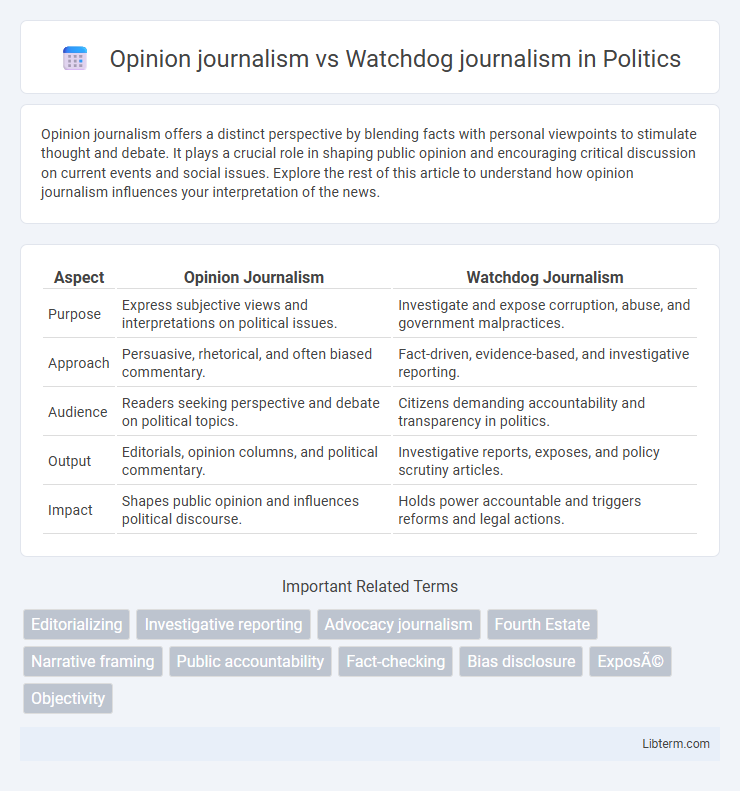Opinion journalism offers a distinct perspective by blending facts with personal viewpoints to stimulate thought and debate. It plays a crucial role in shaping public opinion and encouraging critical discussion on current events and social issues. Explore the rest of this article to understand how opinion journalism influences your interpretation of the news.
Table of Comparison
| Aspect | Opinion Journalism | Watchdog Journalism |
|---|---|---|
| Purpose | Express subjective views and interpretations on political issues. | Investigate and expose corruption, abuse, and government malpractices. |
| Approach | Persuasive, rhetorical, and often biased commentary. | Fact-driven, evidence-based, and investigative reporting. |
| Audience | Readers seeking perspective and debate on political topics. | Citizens demanding accountability and transparency in politics. |
| Output | Editorials, opinion columns, and political commentary. | Investigative reports, exposes, and policy scrutiny articles. |
| Impact | Shapes public opinion and influences political discourse. | Holds power accountable and triggers reforms and legal actions. |
Defining Opinion Journalism
Opinion journalism is a form of reporting where writers express personal viewpoints, interpretations, and analyses rather than strictly presenting factual news. It prioritizes persuasive language and subjective insights to influence public opinion, often found in editorials, columns, and opinion pieces. Unlike watchdog journalism, which investigates and exposes wrongdoing to hold power accountable, opinion journalism emphasizes commentary and perspective over investigative reporting.
Understanding Watchdog Journalism
Watchdog journalism focuses on investigative reporting that holds powerful entities accountable by exposing corruption, abuse, and malpractice. It involves meticulous fact-checking, the use of credible sources, and in-depth analysis to safeguard public interests and promote transparency. Unlike opinion journalism, which centers on personal viewpoints and commentary, watchdog journalism prioritizes evidence-based reporting to inform and protect democracy.
Key Differences Between Opinion and Watchdog Journalism
Opinion journalism primarily involves the expression of personal views and interpretations on current events, often aiming to influence public opinion through editorials, columns, and commentary. Watchdog journalism focuses on investigative reporting that uncovers corruption, abuses of power, and social injustices, providing factual evidence to hold institutions and individuals accountable. The key difference lies in opinion journalism's subjective analysis versus watchdog journalism's objective pursuit of truth and public interest protection.
Historical Origins and Evolution
Opinion journalism traces its roots to the 18th century pamphleteers and political commentators who injected personal viewpoints into public discourse, evolving alongside the rise of mass-circulation newspapers in the 19th century. Watchdog journalism originated in the muckraking era of the early 20th century, characterized by investigative reporters exposing corruption and holding power accountable to the public. Both forms have evolved with modern media platforms, yet opinion journalism emphasizes subjective analysis, while watchdog journalism prioritizes rigorous fact-based scrutiny.
Purpose and Impact on Society
Opinion journalism centers on expressing personal viewpoints and shaping public discourse by influencing readers' beliefs and attitudes, often fueling debate and polarization. Watchdog journalism serves as a critical societal mechanism by investigating and exposing corruption, abuses of power, and systemic failures, holding institutions accountable. The purpose of opinion journalism is to persuade and engage, whereas watchdog journalism aims to protect democracy and promote transparency, significantly impacting social justice and governance.
Ethics and Objectivity in Both Forms
Opinion journalism prioritizes personal viewpoints and subjective analysis, often allowing for bias while still maintaining ethical standards through transparency and accountability. Watchdog journalism emphasizes rigorous investigation and factual reporting to hold power accountable, demanding strict adherence to objectivity and ethical guidelines to ensure credibility. Both forms require ethical responsibility but differ in their approach to balancing personal perspective with impartial truth.
Audience Perception and Trust
Opinion journalism engages audiences by expressing subjective viewpoints, often fostering strong emotional connections but risking perceived bias that can diminish trust. Watchdog journalism focuses on investigative reporting to hold power accountable, typically enhancing credibility and audience trust through fact-based scrutiny. Audience perception tends to favor watchdog journalism for reliability, while opinion journalism appeals more to personal alignment and engagement.
Role in Shaping Public Discourse
Opinion journalism influences public discourse by framing issues through personal perspectives and editorial viewpoints, shaping audience beliefs and attitudes. Watchdog journalism holds power accountable by investigating and exposing corruption, fostering transparency and informed citizenry. Together, these journalistic approaches contribute to a dynamic democratic dialogue and societal awareness.
Challenges Facing Both Journalism Types
Opinion journalism faces the challenge of maintaining credibility while expressing subjective viewpoints, often struggling with accusations of bias and polarization that can undermine public trust. Watchdog journalism encounters obstacles such as limited resources, legal threats, and political pressure that hinder in-depth investigative reporting essential for holding power accountable. Both types must navigate the evolving digital landscape where misinformation and rapid news cycles complicate the pursuit of accurate and impactful storytelling.
The Future of Opinion and Watchdog Journalism
Opinion journalism is evolving with digital platforms enabling more personalized and interactive content, while watchdog journalism is increasingly relying on data analytics and investigative tools to hold power accountable. The future of both lies in integrating multimedia storytelling and AI to enhance audience engagement and fact-checking accuracy. Collaboration between opinion writers and investigative reporters can strengthen public trust and promote informed civic participation.
Opinion journalism Infographic

 libterm.com
libterm.com